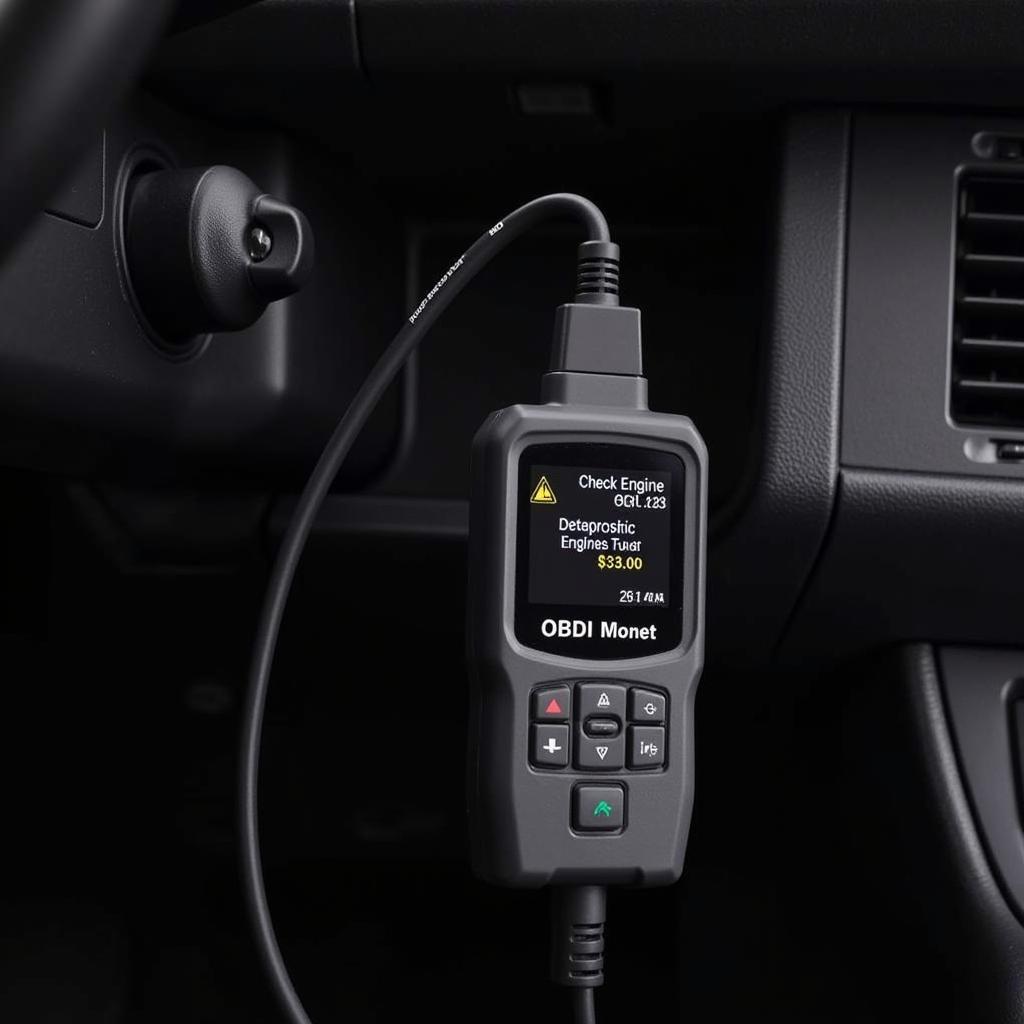Fuel injectors are the tiny but mighty components responsible for spraying the precise amount of fuel into your engine for optimal combustion. When they malfunction, it can lead to a cascade of performance issues, from reduced fuel economy and rough idling to engine misfires and even complete engine failure. That’s where an Injector Scan Tool comes in—an indispensable tool for diagnosing and resolving fuel injector problems quickly and efficiently.
[image-1|injector-scan-tool-diagnosis|Injector Scan Tool Diagnosis|A mechanic is using an injector scan tool to diagnose a fuel injector problem on a car. The tool is plugged into the car’s OBD-II port, and the mechanic is looking at the readings on the tool’s screen. The image highlights the importance of using a scan tool for accurate diagnosis.]
Understanding the Power of an Injector Scan Tool
An injector scan tool, also known as a fuel injector tester or a cylinder balance tester, is a specialized diagnostic device designed to test the performance of fuel injectors. It goes beyond the capabilities of a standard OBD2 scanner by providing in-depth insights into the fuel injection system.
These tools come in various forms, from handheld units to more advanced models integrated into comprehensive automotive diagnostic systems. Regardless of their complexity, they all serve a common purpose: to help you pinpoint faulty injectors and prevent unnecessary replacements.
How Does an Injector Scan Tool Work?
Injector scan tools connect to your vehicle’s OBD-II port, granting access to the engine control unit (ECU). The ECU monitors various engine parameters, including fuel injector pulse width, fuel pressure, and oxygen sensor readings.
By analyzing this data, the scan tool can identify a range of injector-related issues:
- Clogged Injectors: The tool can detect restricted fuel flow caused by clogged injectors, often indicated by a shorter than normal injector pulse width.
- Leaky Injectors: Leaky injectors, which drip fuel into the cylinders even when not needed, can be identified through irregular fuel pressure readings or rich fuel-air mixture data.
- Short-Circuited or Open-Circuited Injectors: Electrical problems within the injector circuit, such as shorts or open circuits, can be diagnosed by analyzing the electrical signals sent to the injectors.
Benefits of Using an Injector Scan Tool
Using an injector scan tool offers numerous advantages for both car owners and professional mechanics:
- Accurate Diagnosis: Forget the days of guessing games. An injector scan tool provides precise data, eliminating guesswork and ensuring you’re addressing the root cause of the problem.
- Time and Cost Savings: By accurately identifying faulty injectors, you can avoid unnecessary replacements, saving both time and money on parts and labor.
- Improved Engine Performance: Addressing injector issues promptly can restore fuel efficiency, optimize engine performance, and reduce harmful emissions.
- Preventative Maintenance: Regular injector testing can help identify minor issues before they escalate into major problems, potentially saving you from costly repairs down the line.
Choosing the Right Injector Scan Tool
With a plethora of injector scan tools available, selecting the right one can seem daunting. Consider these factors to make an informed decision:
- Functionality: Determine the specific features you need, such as the ability to test injector balance, perform injector cleaning cycles, or access live data streams.
- Vehicle Compatibility: Ensure the tool is compatible with your vehicle’s make, model, and year. Some tools are designed for specific vehicle manufacturers, while others offer broader compatibility.
- Ease of Use: Opt for a tool with a user-friendly interface, clear instructions, and intuitive software, especially if you’re a DIY enthusiast.
- Price: Injector scan tools range in price from budget-friendly options to high-end professional-grade devices. Determine your budget and choose a tool that balances features and affordability.
“Investing in a quality injector scan tool is a smart move for any car enthusiast or mechanic. It’s like having an X-ray vision for your fuel injection system.” – Mark Stevenson, ASE Certified Master Technician
Common Injector Problems and Their Symptoms
[image-2|faulty-fuel-injector|Faulty Fuel Injector|Close-up image of a faulty fuel injector with visible deposits and wear, emphasizing the damage that can occur and necessitate testing.]
Understanding common injector problems and their symptoms can help you determine when an injector scan tool is necessary. Here are some telltale signs:
- Rough Idling: If your engine stumbles or vibrates excessively at idle, it could indicate a clogged or malfunctioning injector disrupting the air-fuel mixture.
- Engine Misfires: Misfires occur when the fuel-air mixture fails to ignite properly in the combustion chamber. This can be caused by a clogged, leaky, or electrically faulty injector.
- Reduced Fuel Economy: A noticeable drop in fuel economy can be an early sign of injector problems. Malfunctioning injectors may not deliver fuel efficiently, leading to wasted fuel and reduced mileage.
- Hesitation or Stuttering During Acceleration: If your engine hesitates or stutters when you press the accelerator, it could be a sign of inconsistent fuel delivery from faulty injectors.
- Check Engine Light: While a illuminated check engine light can have numerous causes, it’s often triggered by injector problems.
If you experience any of these symptoms, it’s crucial to have your fuel injectors inspected by a qualified mechanic using an injector scan tool.
[image-3|mechanic-testing-fuel-injectors|Mechanic Testing Fuel Injectors|A mechanic in a professional workshop using an injector scan tool to test the performance of fuel injectors. The image shows the tool connected to a vehicle, with the mechanic examining the results on the tool’s display.]
Beyond Diagnosis: Additional Uses for Injector Scan Tools
Injector scan tools are versatile devices with applications beyond simply diagnosing injector problems. Some models offer advanced functionalities, such as:
- Injector Cleaning: Certain injector scan tools can perform injector cleaning cycles by pulsing the injectors with specific frequencies and durations. This helps remove deposits and restore fuel flow without the need for injector removal.
- Injector Balance Testing: This feature allows you to compare the fuel delivery of each injector, ensuring they are all operating within the manufacturer’s specifications.
- Live Data Monitoring: Advanced scan tools provide real-time data streams of various engine parameters, including injector pulse width, fuel pressure, and oxygen sensor readings. This data can be invaluable for diagnosing complex engine issues.
Conclusion
An injector scan tool is an indispensable tool for anyone who owns, repairs, or maintains vehicles. Its ability to accurately diagnose fuel injector problems saves time, money, and frustration. By understanding the benefits, features, and applications of these tools, you can make informed decisions about maintaining your vehicle’s fuel system and keeping your engine running smoothly.
If you’re experiencing fuel injector problems or want to learn more about injector scan tools, don’t hesitate to contact the experts at ScanToolUS. We’re here to help!
ScanToolUS
Phone: +1 (641) 206-8880
Office: 1615 S Laramie Ave, Cicero, IL 60804, USA
FAQs
1. Can I use a regular OBD2 scanner to test fuel injectors?
While a standard OBD2 scanner can read engine codes related to fuel injectors, it doesn’t provide the in-depth diagnostics offered by a dedicated injector scan tool.
2. How often should I have my fuel injectors tested?
It’s generally recommended to have your fuel injectors tested every 30,000-60,000 miles as part of your regular vehicle maintenance schedule.
3. Can I clean my fuel injectors myself using an injector scan tool?
Some injector scan tools offer injector cleaning functionalities. However, it’s crucial to follow the manufacturer’s instructions carefully and use the recommended cleaning solutions.
4. What are the symptoms of a bad fuel injector on a diesel engine?
Symptoms of bad fuel injectors on diesel engines are similar to those on gasoline engines and can include rough idling, engine misfires, excessive smoke, and decreased fuel economy.
5. Are injector scan tools worth the investment for car owners?
While professional mechanics benefit significantly from injector scan tools, they can also be a worthwhile investment for car owners who perform their own vehicle maintenance and want to avoid costly misdiagnoses.



